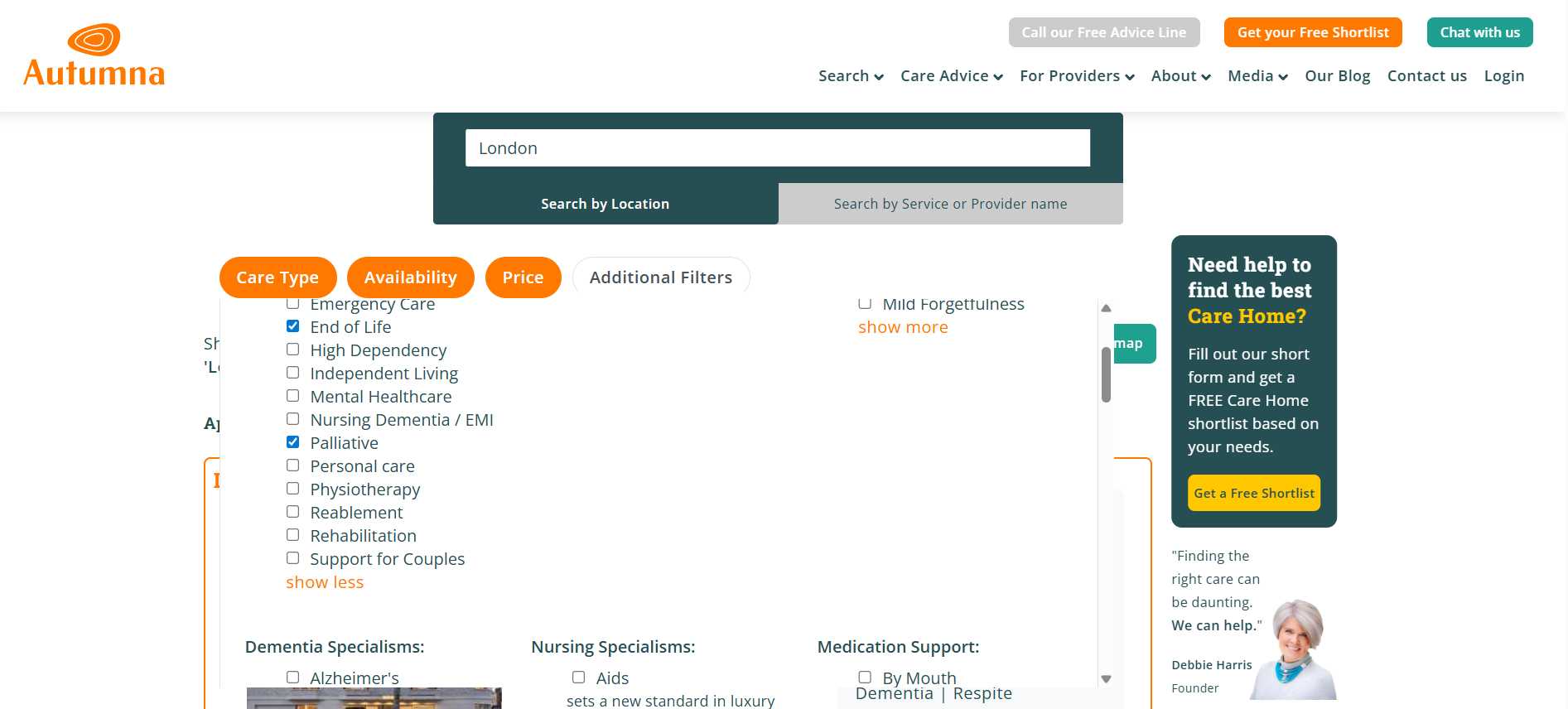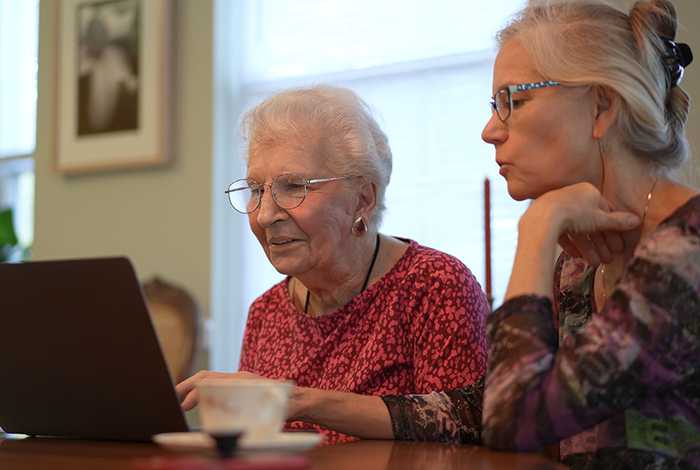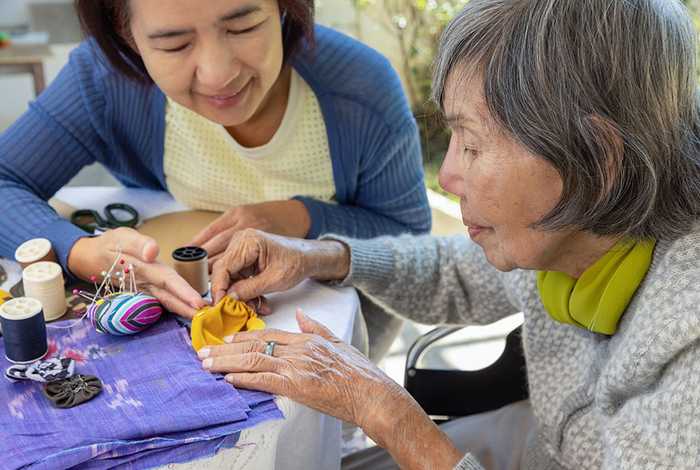Posted by Janine Griffiths
What is the difference between a hospice vs care home

One of the reasons care decisions can feel so overwhelming is the sheer number of unfamiliar terms and types of support.
Words like "care home," "palliative," and "hospice care" are sometimes used interchangeably but they’re not the same.
In the middle of a stressful time, that confusion can leave you feeling stuck, unsure, and afraid of making the wrong call.
That’s why understanding the difference between hospice vs care home isn’t just helpful - it’s essential. The right kind of care isn’t about ticking boxes. It’s about finding what truly fits the needs, values, and circumstances of you and your loved ones.
In this blog, we’ll start by defining what a hospice vs care home is and the key differences between the two.
What is hospice care?
Hospice care is specialist end-of-life support. It begins when a decision is made to stop curative treatment and focus instead on comfort. That doesn’t mean giving up, it means prioritising quality of life, however much time is left.
This type of care can be provided in different places: at home, within a dedicated hospice, or in a hospital setting. Regardless of where it happens, the heart of hospice care is the same. It offers expert symptom relief and comfort, not just for the individual, but for those who love them.
It is worth noting however that most residential hospices are funded by the NHS or by charities, which means that you usually do not have to pay for hospice care. However, if your loved one has additional needs, there is help available. We outline this in detail in our ‘What is hospice care funding?' blog.
What is a care home?
If you’re starting to compare hospice vs care homes, one of the first steps is understanding what a care home really is and who it’s designed for. In the UK, a care home is a place where people live, with full-time access to professional support whenever it’s needed. It’s not a hospital, and it’s usually not temporary unless you are looking for temporary respite care. It’s typically a long-term option that provides stability, safety, and practical help day in, day out.
There are different types of care homes, including residential, nursing, respite care and specialist care homes. We outline the differences between these facilities in our blog ‘What are the main types of care homes for elderly?’
A care home can be a good choice if your loved one is living with frailty, memory loss, or recovering from a stay in hospital and needs more help than can be safely provided at home. The goal is to make life easier, more comfortable, and more secure for the long haul.
When might you need a care home?
The question of hospice vs care home is often wrapped up in another, quieter question: how do I know when it’s time for more help? The answer rarely comes all at once. It might begin with little things - struggling with stairs, forgetting appointments, or feeling constantly tired from trying to provide care for another.
A care home becomes a meaningful option when care needs begin to outgrow what can safely or realistically be provided at home.
Some people choose a care home for a short period of recovery. Others look for long-term stability and peace of mind. What matters most is recognising when support is needed and knowing that a care home can offer it, with warmth, dignity and continuity over time.
When is a hospice the right option?
Choosing between hospice vs care home can stir up difficult feelings, especially when the conversation turns toward end-of-life care. However, understanding when a hospice might be the right path can bring a sense of peace, even in the midst of uncertainty.
Hospice care is usually considered when a person has a life-limiting illness and a prognosis of six months or fewer. It becomes the most compassionate choice when the goal is no longer to treat the illness, but to focus on comfort, relief from pain, and emotional wellbeing. This kind of support is gentle, thoughtful, and deeply personal.
It’s not uncommon to wonder, are we acting too soon? However, hospice care isn’t about rushing anything. It’s about ensuring that your loved one feels as calm, dignified and supported as possible. Far from giving up, choosing hospice can be an act of great love and clarity at a time when it’s needed most.
Can you access hospice care within a care home?
As discussed earlier, hospice care can be delivered in a variety of settings, including within a care home setting.
Some care homes are able to offer palliative or end-of-life care, often with support from a visiting hospice team. Others follow nationally recognised approaches such as the Gold Standards Framework, which helps care homes provide high-quality, coordinated support during the final phase of life.
If this is something you or a loved one may need, it’s worth asking care providers how they support residents during this stage. Not all homes offer the same level or type of care, so open, honest questions can help you feel confident in the choice you make.
Autumna makes it easy to search for care homes that offer palliative care. Simply head over to the search bar on our website and type in your location.
Under Additional Filters, navigate to the ‘Care Given’ section. Check the box next to ‘End of Life’, or ‘Palliative’ care depending on the needs of your loved one.

You will then be able to view a list of care homes that offer the support that is needed.
Choosing what’s right - a human decision, not just a medical one
The choice between hospice vs care home is never only about health or diagnoses. It’s about people. It’s about how someone wants to live, what brings them peace, and how best to support them through whatever lies ahead. That’s why this decision calls for more than medical facts. It asks for honesty, reflection, and gentle conversations with the people who matter most.
While care homes and hospices offer different kinds of support, both can play a vital role in helping someone feel safe, seen and truly cared for. There is no one-size-fits-all answer, and no wrong choice, only what feels right for you or your loved one in this moment.
Be open with professionals. Ask about funding, day-to-day routines, emotional support and what to expect. When the facts are clear and the heart is heard, the next step often feels less like a leap and more like a gentle step in the right direction.
Need more support?
If you find the process of searching for a care home challenging, Autumna can help. Our shortlisting tool can take you through the process of searching for a care provider by prompting you with a few quick questions and generating a list of providers based on your answers.
Alternatively, if you need to talk through your options, contact us on 01892 335 330.
Receive a Free Care Home Shortlist!
Let our expert team of advisers get your search off to a great start.
Tell us a little about your needs and we'll send you a bespoke shortlist of care homes! Click the button below to begin, it takes just a few minutes.
Other articles to read
From the blog

Older Persons Care Advice
Ultimate guide to jointly owned property and care home fees
September 26th, 2025
Understand jointly owned property and care home fees, how assessments work, and steps to protect your finances and plan ahead with confidence.

Older Persons Care Advice
What are the pros and cons of care homes?
September 26th, 2025
Weigh the pros and cons of care homes to make the right choice for you or a loved one. Discover benefits, challenges, and tips for finding the best fit.

Older Persons Care Advice
Person centred care and dementia: A guide for families
September 23rd, 2025
Discover how person centred care and dementia support go hand in hand. Learn practical tips, expert insight, and guidance for families seeking the best care.
Frequently Asked Questions
Yes. In fact, assisted technology often enhances personalised care. It gives staff more time and better information to tailor their support to your specific needs, rather than replacing any part of it.
Not necessarily. Technology is usually there to support the team, not reduce it. In most care homes, it’s used to improve response times and allow staff to focus more on one-to-one, human interaction.
Yes, many systems are specifically designed with dementia care in mind. They can help reduce confusion, keep people safe, and support a calm, reassuring environment without being intrusive.
In most homes, yes. Technology use is usually discussed as part of your care plan, and you can express preferences or ask questions about what you’re comfortable with.
The UK's largest & most detailed directory of elderly care and retirement living options
10,318
Care Homes
11,950
Home Care Services
1,657
Live-in Care Services
1,756
Retirement Living Developments
Autumna is the UK's largest and most comprehensive later-life living & elderly care directory. Our detailed search facility and team of expert advisors can help you find the best care homes, nursing homes, retirement homes, retirement villages, home care, and live-in care services for you or your loved one's needs. Our website is free to use, we are proudly independent, and we never take referral fees.






